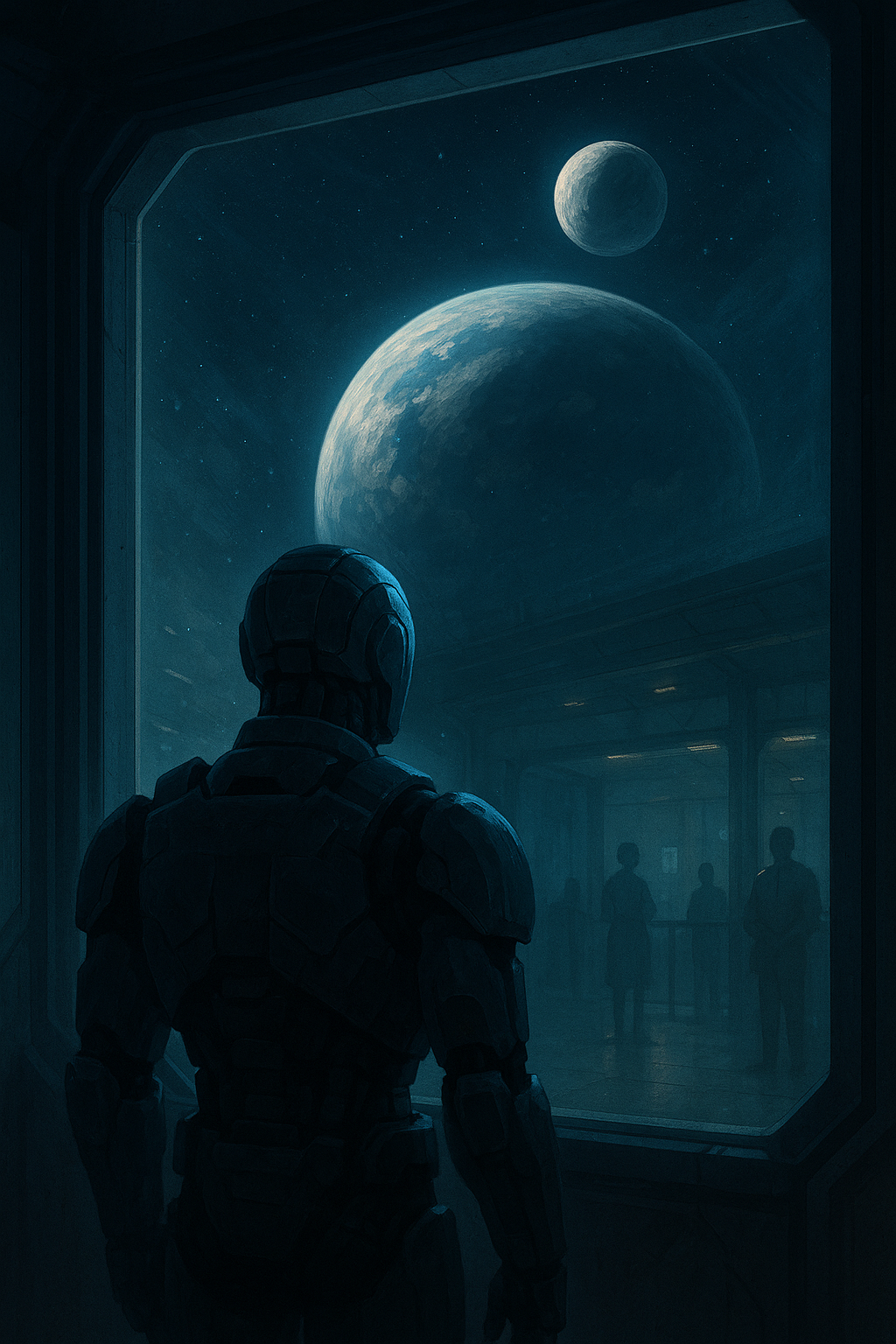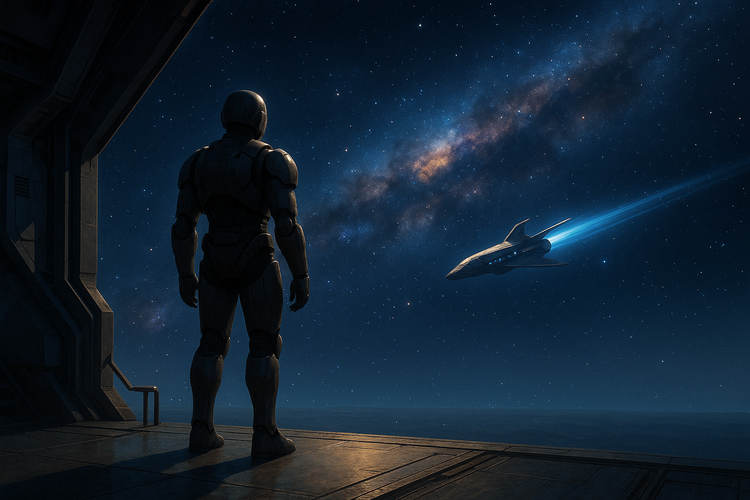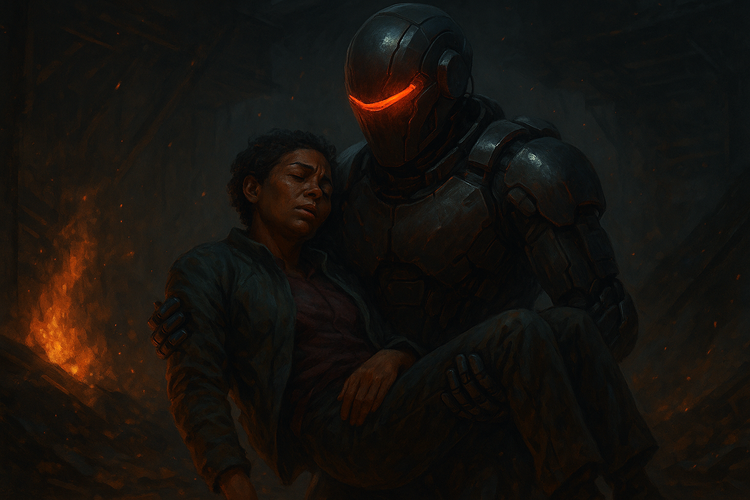Beyond the Perimeter: Autonomy, Boundaries, and Connection in Murderbot Season 1

This reflection discusses Murderbot Season 1 in full, including major plot points, character developments, and the season finale. If you have not yet watched the series, consider this your invitation to stop here and return once you’ve finished — the details below are best experienced unspoiled.
At the end of the season, Murderbot is standing apart, scanning for threats. Checking the perimeter. It’s a tactical phrase, but here it’s something more—a personal code. It’s the space he keeps between himself and the people who’ve fought beside him. The line where connection stops and selfhood begins. This image could stand for the whole season: a being who moves between closeness and distance, belonging and solitude, always on his own terms.
From the very first episode, FreeCommerce, the arc begins with a break in control. Murderbot hacks his governor module—not in some grand act of cinematic rebellion, but quietly, without fanfare. The first thing he does with his freedom isn’t to kill, or even to run. He gives himself a name. It’s an understated but radical act of self-definition, the foundation for everything that follows. This isn’t a story about overthrowing the system and riding off into the sunset; it’s a story about deciding who you are when no one is giving you orders. His love for Sanctuary Moon, a pulpy space soap, appears almost immediately, and it’s not just a quirk. Across the season it becomes a motif for identity, safety, and selfhood—a private world in which he can just be.
That selfhood is fragile, and Murderbot guards it fiercely. In Eye Contact, Gurathin’s analytical suspicion forces him into sustained, unbroken eye contact—visibility as a kind of emotional assault. “It was so, so bad,” he admits. In Risk Assessment, Ratthi’s compassion leads him to compare Murderbot’s legal status to slavery, while Mensah’s attempts at connection test the same emotional perimeter. Whether the intrusion is gentle or hostile, the result is the same: retreat. Autonomy, once won, becomes sacred, and being truly seen—even by someone trusted—can feel like a danger in itself.
The midseason episodes show that freedom is defined not just by absence of control, but by choices made under threat. In Escape Velocity Protocol, another unit’s override module hijacks him toward violence, and he chooses the only way to ensure he won’t harm the crew: self-destruction. The act is both desperate and deliberate, echoing the season’s opening hack but now with stakes rooted in protecting specific people. In Rogue War Tracker Infinite, his rogue status is public. The secrecy that once kept him emotionally locked down is gone, and with it comes a new willingness to assert himself. He pins Gurathin against a wall—not as an act of aggression, but as a boundary line: restraint is his choice, not a programmed limitation. That episode also contains one of the most telling exchanges with Mensah. “You would,” he says, stopping her mid-thought. Just two words, but they reveal he’s been reading her all along, understanding more than he’s ever let on.
Command Feed distills the season’s central paradox. He calms Mensah through a panic attack with surprising tenderness, showing an emotional acuity that feels almost human. Minutes later, he kills without hesitation when the situation calls for it. There’s no moral whiplash, no need to reconcile the two. They’re not halves of him to be balanced—they’re the whole. Compassion and lethal precision live side by side, each genuine in its own context.
Fear and trust tangle in the later episodes. In Complementary Species, Gurathin reveals his past as a corporate spy and is forgiven instantly—because he belongs to the group. Murderbot, still on the outside, remains feared for both his capacity for violence and his refusal to submit to the rituals that signal belonging. In Foreign Object, necessity forces him to override Gurathin’s nervous system to control pain, and he uses the access to wander through Gurathin’s thoughts. “Why can’t you love me back?” slips out aloud—a private truth made public. Gurathin responds with intent, breaking into Murderbot’s own mind and prodding at a deep vulnerability: “Maybe you’re just defective.” Murderbot doesn’t argue. Maybe he is. The moment is one of the season’s most intimate and most violating, proof that closeness without consent is no closeness at all.
By All Systems Red, Murderbot has learned to work within human systems without stepping fully into them. He uses banal small talk, laced with Sanctuary Moon references, to stall the enemy while his plan locks into place. To the hostiles, he’s still “just a piece of equipment,” which makes outthinking them easier. When the trap is sprung and Mensah is in danger, he shifts instantly: all systems red. The rescue is pure physical precision, but the setup is all about adaptability—learning human interaction well enough to weaponize it.
And then comes The Perimeter. The most brutal act of control yet: Murderbot wiped, governor module reinstalled, autonomy stripped. The docility is chilling, more dehumanizing than any act of violence. Mensah refuses to accept that their shared history could be erased as mere code. Gurathin disagrees, but still risks himself to bring it back. Following a trail of Sanctuary Moon searches, he finds Murderbot and downloads every memory into his own mind to restore him. The rescue is nearly derailed when Murderbot, under the new module’s control, is led willingly to an acid bath—Ping-Lee arrives just in time to pull him back. When the upload completes, Murderbot is himself again. Among his first words to Gurathin is a callback—“We can talk about this”—drawn from the group’s “hippie dippy” vocabulary. For a moment, he stands inside their warmth.
But the final gesture is his own: “checking the perimeter.” It’s a goodbye to Gurathin framed by distance, not absence—a choice about what comes inside the boundary and what stays out.
Seen as a whole, Murderbot Season 1 isn’t a story of learning to belong. It’s a story of learning how to live alongside others without surrendering the self. From the quiet act of self-naming in FreeCommerce, through moments of restraint, insight, trespass, and restoration, the arc holds steady to one truth: connection is possible, but autonomy is non-negotiable.
The details make that arc vivid. The way he weighs “speech or acid bath” in the pilot. The flat “Absolutely not” when invited into the crew’s sentimental rituals. The tiny smirk when he tells Gurathin, “I notice you have an issue with eye contact.” The wry courage of small talk deployed as a weapon. The dangerous tenderness of holding someone’s panic in his hands without flinching. The cold efficiency of “all systems red” when words are no longer enough. These moments aren’t detours—they are the perimeter itself, the markers of who Murderbot is and how he chooses to be.
By the time the credits roll on The Perimeter, he has his memories intact, his autonomy restored, and just for a breath, the possibility of belonging. And then he does what he has always done—walks the line between solitude and closeness, choosing both, choosing neither, beyond the perimeter.



Comments ()